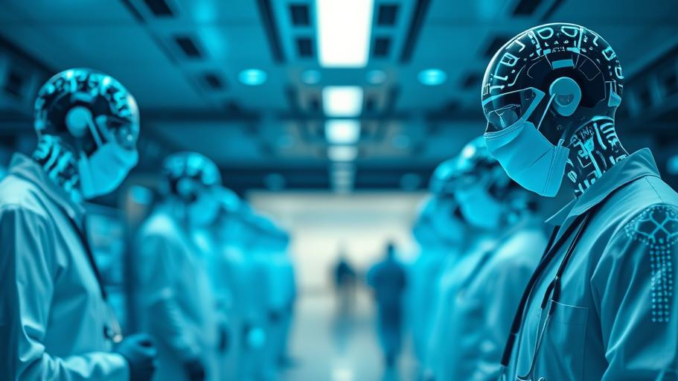
Summary
This article explores the transformative impact of Artificial Intelligence (AI) on healthcare, from diagnostics and treatment to drug discovery and administrative tasks. It discusses the various benefits of AI, including improved accuracy, personalized treatments, and cost reduction, while acknowledging potential challenges. Finally, it emphasizes the importance of ethical considerations and responsible implementation of AI in healthcare.
** Main Story**
Okay, so AI… it’s kind of a big deal in healthcare right now, and it’s changing things fast. We’re not just talking about minor tweaks either; it’s a real revolution. From spotting diseases earlier than ever to making paperwork less of a headache, AI is poised to reshape healthcare as we know it. Think better outcomes for patients and a more efficient system overall. Who wouldn’t want that?
AI’s Doing All Sorts of Things
Seriously, the ways AI is being used in healthcare are pretty wild. Take diagnostics, for example. AI can analyze X-rays and MRIs faster, and often more accurately, than a human radiologist. We’re talking about catching things like cancer at earlier stages, and that can be a game-changer. It’s also a huge help in pathology, speeding up the analysis of biopsies. It’s like having a super-powered microscope!
And it’s not just about images. AI can crunch massive amounts of patient data, spotting patterns and predicting potential health risks. That lets doctors get ahead of the curve with preventative care. This kind of predictive power is great for managing chronic conditions, too, allowing for treatments to be super personalized. And as if that wasn’t enough, AI is speeding up drug discovery, finding new drug candidates and making clinical trials way more efficient. The process can still be long though, especially with FDA approval. One thing at a time, right?
But AI isn’t just for doctors; I mean, it also helps with the administrative side of things too. Think automating tasks like scheduling appointments, processing insurance claims, and managing electronic health records. That frees up healthcare providers to actually focus on, you know, patient care. Plus, AI-powered chatbots can provide 24/7 access to medical information and support. That improves patient experience. I know I’d rather get a quick answer from a chatbot than wait on hold forever.
The Good and The, Well, Complicated
Look, putting AI into healthcare has tons of advantages. You’ve got better diagnostics, personalized treatments, and faster drug discovery. All that means better outcomes for patients and potentially lower costs. Plus, by automating those boring tasks, AI gives healthcare pros more time to focus on patients. And it empowers patients by giving them access to more information and support. So far so good!
That said, it’s not all sunshine and roses. There are some serious ethical questions. What about data privacy? Algorithmic bias? The possibility of AI replacing healthcare workers? These aren’t things we can just ignore. Transparency and accountability are essential, if you want people to trust these systems. And we need rules and guidelines in place to deal with the legal and ethical stuff, too, otherwise it’s going to be the wild west! And don’t forget, plugging AI into existing healthcare systems is going to cost money, plus, we’re going to have to train healthcare workers to use it properly.
What’s Next?
AI’s role in healthcare is only going to get bigger, honestly. Researchers are constantly pushing the envelope. Expect even better diagnostics, personalized treatments, and disease prediction. Also, the combination of AI with things like the Internet of Medical Things (IoMT) and wearable devices will take things to another level. Imagine continuous monitoring and real-time data analysis! I think the future will be a partnership between humans and AI, where AI helps us do our jobs even better, leading to more effective and patient-centered care.
Sure, there will be challenges along the way, but I think AI has the potential to revolutionize healthcare. I think it will make it more accessible, efficient, and personalized than ever before. It’s pretty exciting, isn’t it? You know, if you think about it?


Be the first to comment